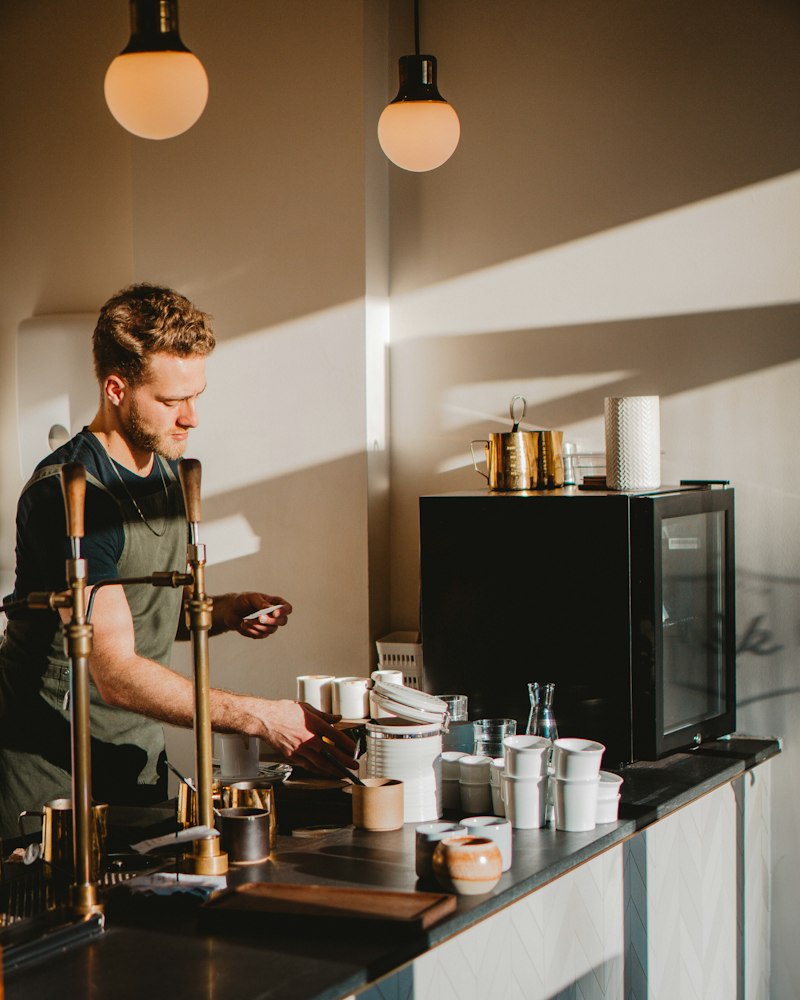Table of Contents
Are you curious about the barista minimum wage? Well, prepare to be amazed as we delve into the world of coffee-making and explore the earnings of these talented individuals. Being a barista is more than just brewing a cup of joe; it’s an art form that requires skill, precision, and a dash of creativity. But how much do these coffee aficionados actually earn?
When it comes to the barista minimum wage, it varies depending on several factors such as location, experience, and the establishment they work for. Just like blending different coffee beans to create a harmonious flavor, the wages of baristas are a blend of different elements.
In some countries, baristas are entitled to the national minimum wage, which ensures they receive a fair compensation for their hard work. However, in other places, the minimum wage might not specifically address the unique circumstances of baristas. In these cases, baristas often rely on industry standards and negotiation skills to secure a reasonable income.
It’s important to note that experience plays a significant role in determining a barista’s earning potential. Much like the aging process that enhances the flavors of coffee beans, baristas’ skills develop over time, allowing them to command higher wages. Seasoned baristas with a wealth of knowledge and expertise are often rewarded with better pay and opportunities for career advancement.
The type of establishment also influences a barista’s earnings. Working at a small independent coffee shop could offer a cozy atmosphere and a sense of community, but the wages might be on the lower end of the spectrum. On the other hand, being employed by a renowned specialty coffee chain might provide better compensation due to their brand recognition and larger customer base.
the barista minimum wage is a unique blend of various factors including location, experience, and the type of establishment. While there is no one-size-fits-all answer, it’s clear that being a barista is more than just a part-time job. It’s a craft that requires passion, skill, and a deep understanding of the art of coffee-making. So, next time you sip on your favorite brew, take a moment to appreciate the dedication and hard work that goes into creating that perfect cup of coffee.
Pouring Over the Numbers: The Impact of Barista Minimum Wage on Coffee Industry
Are you a
coffee lover who can’t start the day without that perfect cup of joe? Have you ever wondered about the people behind the counter who skillfully craft your favorite beverage? Baristas, those talented individuals who create art in a cup, play an integral role in the coffee industry. However, their compensation has been a topic of discussion lately, particularly the impact of barista minimum wage on the industry. Let’s dive deeper into this subject and explore its implications.When we talk about minimum wage, it’s essential to understand its significance for baristas. These dedicated professionals work diligently to satisfy our caffeine cravings, but their salaries often fall within the lower income bracket. The question arises: how does increasing the minimum wage affect them and the coffee industry as a whole?
Raising the barista minimum wage has both immediate and long-term consequences. On one hand, higher wages would undoubtedly improve the livelihoods of baristas, enabling them to meet their basic needs and potentially reducing turnover rates. A content and motivated workforce would naturally lead to better customer experiences, ensuring that every cup of coffee is brewed with care and passion.
However, when we consider the broader impact, there are other factors to take into account. Increased labor costs resulting from a higher minimum wage could potentially lead to rising prices for coffee shop owners. Consumers may feel the pinch of paying a little extra for their daily dose of java. This, in turn, might influence their purchasing decisions, leading them to explore alternative options or even brew their own coffee at home.
Furthermore, small, independent coffee shops, which often operate on slim profit margins, might face additional challenges. They may need to make difficult choices such as reducing staff or hours of operation, which can have a negative impact on service quality and customer loyalty.
In summary, raising the barista minimum wage has the potential to improve the lives of these dedicated professionals, fostering a positive work environment and enhancing customer satisfaction. However, it also poses challenges for coffee shop owners, who may need to navigate higher labor costs and potential business implications. As consumers, it is crucial for us to be aware of these dynamics and support our beloved coffee industry while acknowledging the needs of those who serve us our daily cup of joy.
Brewing Controversy: Should Baristas Earn More Than the Minimum Wage?
Have you ever sipped on a perfectly brewed cup of coffee and wondered about the individuals who masterfully concocted it? Yes, I’m talking about baristas—the unsung heroes of the caffeine-fueled world. While we relish the aromatic delights they serve, a brewing controversy is taking shape: should baristas earn more than the minimum wage?
Let’s dive into this thought-provoking topic. At first glance, some may argue that being a barista is just a “simple” job, involving the art of pouring hot water over coffee grounds. However, that’s like saying a symphony is merely plucking strings. The truth is, crafting the perfect cup of joe requires skill, precision, and years of dedication. Baristas undergo rigorous training to master various brewing techniques, perfect latte art, and understand the complexities of different coffee beans. They transform a humble beverage into an experience that tantalizes our taste buds.
Considering the amount of effort and expertise required, it seems only fair to question if baristas deserve more than the minimum wage. After all, their work directly contributes to the success and reputation of coffee shops. A talented barista can attract loyal customers, boosting sales and profits. In this context, paying baristas a higher wage could be seen as an investment in both quality and customer satisfaction.
Furthermore, let’s not forget the demanding nature of the job. Baristas juggle multiple tasks simultaneously, managing long queues of customers with diverse preferences. They navigate high-pressure situations while maintaining composure and delivering exceptional service. This level of multitasking and customer interaction requires exceptional interpersonal skills and a keen eye for detail. Baristas are akin to culinary artists, serving up happiness in a cup while creating a welcoming atmosphere for coffee enthusiasts.
To put it into perspective, imagine a world without skilled baristas. It would be like a symphony missing its conductor—a chaotic mess lacking harmony and finesse. Baristas are the backbone of coffee culture, providing us with a daily dose of energy and delight. Recognizing their invaluable contribution by offering more than the minimum wage is not just an ethical consideration but also a way to ensure the sustainability of this cherished craft.
the debate surrounding whether baristas should earn more than the minimum wage continues to percolate. When we consider the expertise, effort, and impact of baristas on both coffee shops and customers alike, it becomes evident that paying them a higher wage is a worthy proposition. So, the next time you enjoy that steaming cup of perfection, take a moment to appreciate the barista’s artistry and ask yourself: don’t they deserve to earn more?
From Beans to Bills: Baristas Fight for a Fair Minimum Wage
Introduction:
Have you ever wondered about the journey from beans to bills? Behind every perfectly crafted latte or cappuccino lies the hard work and dedication of baristas. These talented individuals are the backbone of our coffee culture, yet many of them struggle to make ends meet due to low wages. In this article, we will delve into the pressing issue of baristas fighting for a fair minimum wage.
The Struggles of Baristas:
Baristas, the skilled artists behind the espresso machines, face numerous challenges in their quest for fair compensation. Despite the immense responsibility they shoulder in creating exquisite coffee beverages, they often find themselves earning minimum wage or even less. This inadequate pay fails to reflect the specialized skills required in crafting the perfect cup of joe.

A Battle for Fairness:
Recognizing the need for change, baristas across the nation have united in their fight for a fair minimum wage. They argue that their expertise, multitasking abilities, and commitment to customer satisfaction warrant higher compensation. By advocating for a living wage, these dedicated individuals hope to improve their own lives and uplift the entire barista community.
Support from the Coffee Community:
The call for a fair minimum wage is not limited to baristas alone. Coffee enthusiasts, loyal customers, and even coffee shop owners are joining forces to support this cause. Many coffee shops prioritize ethical practices by sourcing directly from farmers and investing in sustainable initiatives. It only makes sense to extend that dedication to ensuring fair wages for those who bring the magic of coffee to life.


Implications for the Coffee Culture:
By acknowledging the value of baristas’ contributions and paying them a fair wage, we can foster a more inclusive and vibrant coffee culture. A fair minimum wage would attract and retain skilled baristas, encouraging excellence and innovation within the industry. Ultimately, it would result in better experiences for coffee lovers around the world, as happy and well-compensated baristas can channel their creativity into every cup they serve.
Conclusion:
Steaming Up the Debate: How Barista Minimum Wage Impacts Small Coffee Shops
Are you a coffee enthusiast who enjoys sipping on a perfectly brewed cup of joe at your favorite local coffee shop? Have you ever wondered about the impact of barista minimum wage on these small establishments? Let’s dive into the debate and uncover the implications.

Small coffee shops are the heart and soul of many communities, serving up delicious caffeinated concoctions with a side of warm ambiance. These establishments often rely on dedicated baristas to create the perfect coffee experience for their customers. However, recent discussions surrounding minimum wage have sparked a heated debate within the industry.
When it comes to paying baristas, small coffee shop owners find themselves at a crossroads. On one hand, they want to compensate their hardworking employees fairly, recognizing their vital role in the business. On the other hand, they face financial constraints that can make it challenging to meet higher minimum wage requirements.
Increasing barista minimum wage can have a significant impact on small coffee shops. While the intention behind raising minimum wage is noble, it can lead to some unintended consequences for these cozy establishments. The increased labor costs may force them to make tough decisions, such as cutting employee hours, reducing staff, or even increasing prices to compensate for the added expenses.
Moreover, the potential ripple effect doesn’t stop there. Small coffee shops often rely heavily on loyal customers who appreciate the personalized service and unique atmosphere they offer. If prices go up or quality suffers due to financial strains, it might drive customers away, seeking more affordable alternatives or sacrificing the cozy experience they once cherished.
It is important to strike a delicate balance between fair compensation for baristas and the sustainability of small coffee shops. Finding alternative solutions, such as optimizing operational efficiency, exploring creative pricing strategies, or seeking government assistance, could help mitigate the potential negative impacts of barista minimum wage hikes.
the debate surrounding barista minimum wage and its impact on small coffee shops is a hot topic in the industry. While fair compensation is crucial, it’s essential to consider the potential consequences for these cozy establishments. As coffee lovers, let’s support our favorite local coffee shops and find ways to ensure they can continue serving up delightful brews without compromising their unique charm.





